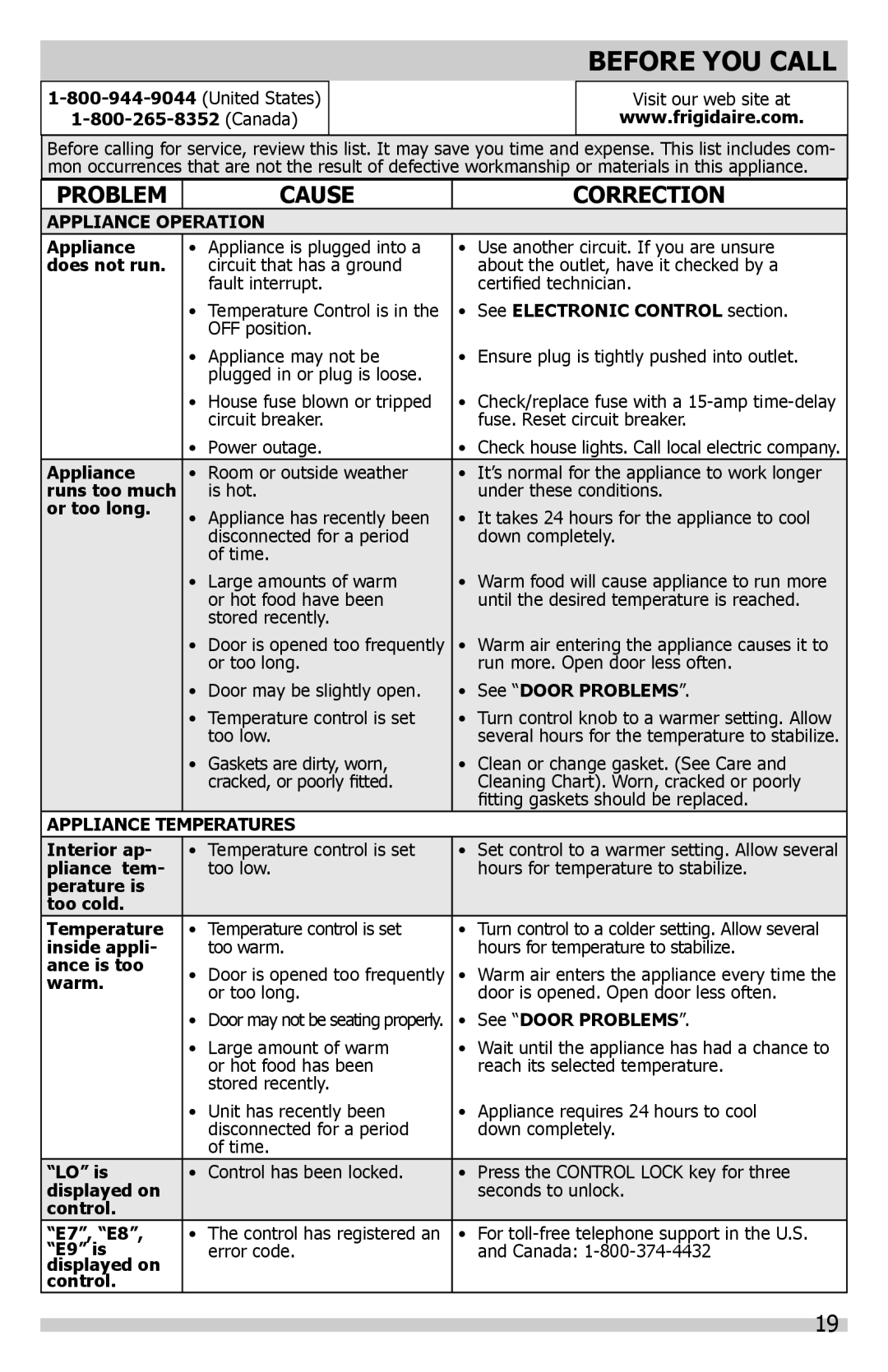
BEFORE YOU CALL
Visit our web site at
www.frigidaire.com.
Before calling for service, review this list. It may save you time and expense. This list includes com- mon occurrences that are not the result of defective workmanship or materials in this appliance.
PROBLEM |
| CAUSE |
| CORRECTION | |
APPLIANCE | OPERATION |
|
| ||
Appliance | • | Appliance is plugged into a | • Use another circuit. If you are unsure | ||
does not run. |
| circuit that has a ground |
| about the outlet, have it checked by a | |
|
| fault interrupt. |
| certified technician. | |
| • Temperature Control is in the | • | See ELECTRONIC CONTROL section. | ||
|
| OFF position. |
|
| |
| • | Appliance may not be | • | Ensure plug is tightly pushed into outlet. | |
|
| plugged in or plug is loose. |
|
| |
| • House fuse blown or tripped | • Check/replace fuse with a | |||
|
| circuit breaker. |
| fuse. Reset circuit breaker. | |
| • | Power outage. | • Check house lights. Call local electric company. | ||
Appliance | • | Room or outside weather | • It’s normal for the appliance to work longer | ||
runs too much |
| is hot. |
| under these conditions. | |
or too long. | • Appliance has recently been | • It takes 24 hours for the appliance to cool | |||
| |||||
|
| disconnected for a period |
| down completely. | |
|
| of time. |
|
| |
| • | Large amounts of warm | • | Warm food will cause appliance to run more | |
|
| or hot food have been |
| until the desired temperature is reached. | |
|
| stored recently. |
|
| |
| • Door is opened too frequently | • Warm air entering the appliance causes it to | |||
|
| or too long. |
| run more. Open door less often. | |
| • Door may be slightly open. | • | See “DOOR PROBLEMS”. | ||
| • Temperature control is set | • Turn control knob to a warmer setting. Allow | |||
|
| too low. |
| several hours for the temperature to stabilize. | |
| • Gaskets are dirty, worn, | • | Clean or change gasket. (See Care and | ||
|
| cracked, or poorly fitted. |
| Cleaning Chart). Worn, cracked or poorly | |
|
|
|
| fitting gaskets should be replaced. | |
APPLIANCE | TEMPERATURES |
|
| ||
Interior ap- | • | Temperature control is set | • Set control to a warmer setting. Allow several | ||
pliance tem- |
| too low. |
| hours for temperature to stabilize. | |
perature is |
|
|
|
| |
too cold. |
|
|
|
| |
Temperature | • | Temperature control is set | • Turn control to a colder setting. Allow several | ||
inside appli- |
| too warm. |
| hours for temperature to stabilize. | |
ance is too | • Door is opened too frequently | • | Warm air enters the appliance every time the | ||
warm. | |||||
| or too long. |
| door is opened. Open door less often. | ||
|
|
| |||
| • Door may not be seating properly. | • | See “DOOR PROBLEMS”. | ||
| • | Large amount of warm | • Wait until the appliance has had a chance to | ||
|
| or hot food has been |
| reach its selected temperature. | |
|
| stored recently. |
|
| |
| • Unit has recently been | • Appliance requires 24 hours to cool | |||
|
| disconnected for a period |
| down completely. | |
|
| of time. |
|
| |
“LO” is | • | Control has been locked. | • | Press the CONTROL LOCK key for three | |
displayed on |
|
|
| seconds to unlock. | |
control. |
|
|
|
| |
“E7”, “E8”, | • | The control has registered an | • For | ||
“E9” is |
| error code. |
| and Canada: | |
displayed on |
|
|
|
| |
control. |
|
|
|
| |
19
